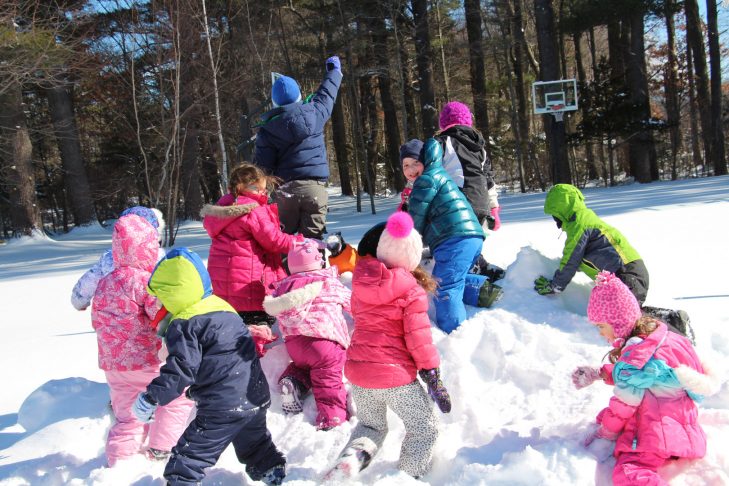It’s a Friday morning in February. The schedule on the kindergarten classroom wall says it’s time for science, but the classroom is empty. Bundled up in snow pants, gloves, hats, and boots, they will spend the morning in Rashi’s outdoor laboratory—its nature trails, woods, river, and open fields. With sketchbooks in hand, they will visit the tree that they have been studying all year. Their teacher guides them with a set of questions, “what do you see? How has it changed since the last time you observed it? How many details of your tree can you draw from memory? What details can you add if you look closely?” As the class begins to make their way back to the classroom, they are given a set of challenges. Identify at least one set of animal prints. Find something that is created by people and something that is created by nature. What is the evidence for your answer? Before they go inside, they stop to roll down a hill.
Learning in the outdoors is essential for the well-being of our students. Kindergarten teacher, Sharon Miller reflects, “We spend so much time being entertained inside. It’s important to be outside to see, to breathe, to touch.” Across all grades, our teachers find that students are more focused in the classroom if they have had enough time to let out their energy outside of the classroom. This time outside, which can often be more unstructured than their time in the classroom, provides students with the optimal environment to work through problems that may arise. Opportunities to learn outside are woven through all grades at Rashi.
Each year in mid-November, the Sixth Grade students make a trip to Nature’s Classroom in Charlton, Massachusetts. They explore the outdoors both in the day and at night. Through a series of exercises designed to challenge them to trust each other and to advocate for themselves through questioning, they learn to problem solve, be more self-sufficient, rely on each other, and practice teamwork.
During these intense days in nature, our students learn shomrei adamah, that they are guardians of the earth and think about what they can do to protect the world around them. Whether learning about animal camouflage, the shapes of leaves, the types of Hemlock or looking at the shafts of sunlight as they fall on the ground, they use their senses and appreciating all that our earth offers.
Backs in the grass, looking up at the stars, a group of students listens carefully for the distant calls of an owl or even the lonely cry of a coyote. Recreating the sounds they hear, Rashi’s sixth graders converse with the wildlife. Thursday morning minyan is held outdoors. Some students cluster around trees and some find their spiritual peace in open spaces. Others look up at the clouds and sky and appreciate the beauty and gifts of the earth around them. They come away from this four-day experience with knowledge of ecology, biology and with the new insight and appreciation; if we take care of the earth, the earth gives back to us.
This post has been contributed by a third party. The opinions, facts and any media content are presented solely by the author, and JewishBoston assumes no responsibility for them. Want to add your voice to the conversation? Publish your own post here. MORE

